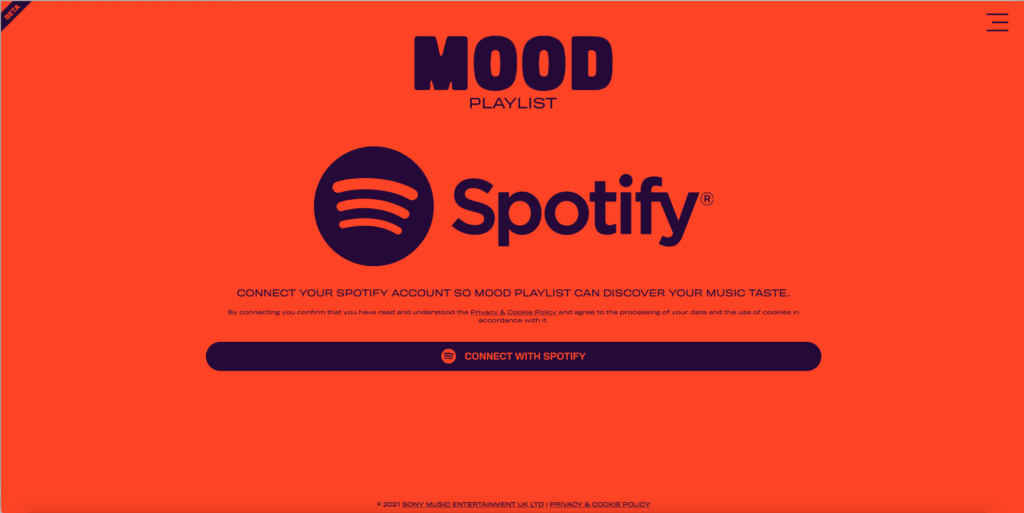
Millions of playlists are created every year. Why should anyone care about two more playlist initiatives from two of the major labels?
It’s a good question. And normally we would pay little heed to a major-led playlist push. Except these two new ones from Sony and Warner are very different.
We will look at each in turn.
First is Mood Playlist – what Sony is calling its “advanced personal playlist generator”. The browser-based generator was developed by the major’s 4th Floor Creative division in the UK.
It is currently in beta and has the tagline: “instantly make a Spotify playlist to suit your mood and taste.”
As per the instructions, first you set your mood, based around four categories (upbeat, downbeat, energetic, mellow), with the site allowing you to blend them slightly (e.g. set the cursor of the cusp of upbeat and energetic or the cusp of downbeat and mellow).
You then connect to your Spotify account and pick five acts to suit your mood (this appears to be artists you have on heavy rotation already or have played recently). It then creates a 30-track playlist that is automatically added to your Spotify.
The best part about it is that it all appears to be label agnostic and not stuffed to the gills with Sony artists. When we created our first playlist there were only a handful of Sony acts (Little Mix (twice), Meghan Trainor) alongside some acts from the other majors (Lady Gaga, Taylor Swift, Dua Lipa) and a wide range of indies (acts on Mute, Heavenly, Jagjaguwar, Lucky Number and Rough Trade among others all feature). That may be down to our own listening but it did not feel like Sony artists were being unnecessarily crowbarred in here.
(That said, maybe another Sony act rather than a second track by Little Mix – no shade on Little Mix, of course – would have been a better use of the algorithm.)
“Our ambition when creating Mood Playlist was to better understand the correlations between mood, taste and appropriate music,” said lead web developer Lewis Donovan of the project.
Music Ally asked Sony for clarification on how it would use the data this project generates. “Sony Music UK is only collecting the minimum data necessary for Mood Playlist to function,” a spokesperson told us. “However, they may target Mood Playlist users with ads for other relevant initiatives in the future. Sony’s main ambition with this project is to better understand the correlations between mood, taste and appropriate music.”
Turning to Warner, it is using playlists as therapy and education tools for people with speech-sound disorders.
Along with Apple Music it has created what it is calling “Saylists” that collate songs with lyrics that repeat challenging sounds. There are 10 playlists that are built around specific single letters and combinations of letters that are difficult for those with speech-sound disorders to pronounce (such as “s”, “t”, “z” and “ch”).
Because repetition in speech therapy can be boring or exasperating for young people with speech issues, the belief is that tying them to music will help smooth the process here, make it more fun and help them overcome their difficulties.
Anna Biavati-Smith, a speech and language therapist who worked on the project, said, “Every speech and language therapist wants to keep children engaged during the therapy sessions as well as help them generalise the target sounds, both in school and at home. Saylists provide a fun, new way to practise the sounds I teach them – without feeling pressured or getting bored. Having fun is the first step to learning.”
Tony Harlow, CEO, Warner Music UK, added, “We believe utterly in the power of music and its ability to change people’s lives for the better. Helping people express themselves is at the heart of what we do, and we hope that by creating a therapeutic tool that’s as engaging and accessible as Saylists, we can help anyone who’s struggling with their speech.”
The idea was originally put forward by Warner Music Ireland and Accenture Interactive built the algorithm that sweeps songs on Apple Music to identify patterns of vocal repetition in songs that can help those with speech-sound disorders.
Warner acts like Dua Lipa, Michael Bublé and Ed Sheeran are, as expected, well represented (often having the lead track in each playlist), but there are also plenty of non-Warner acts included.